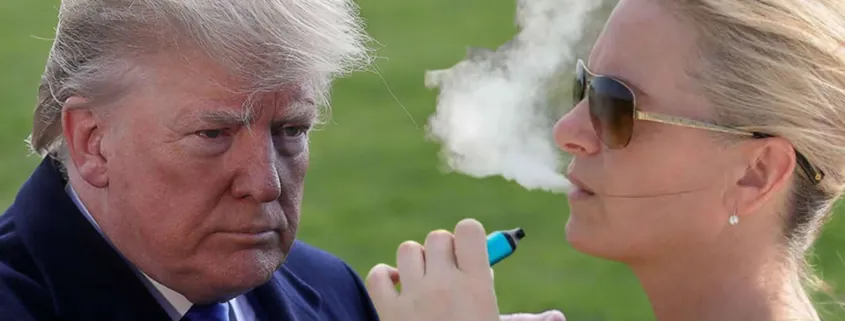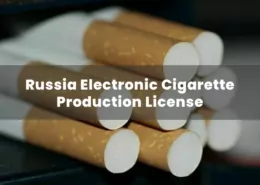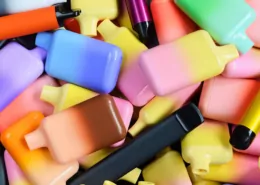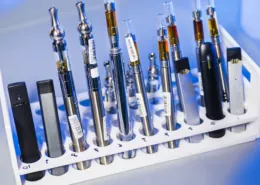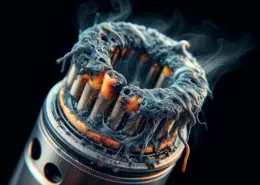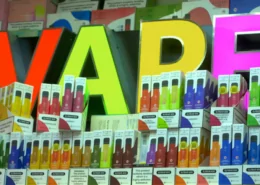Trump’s Potential Return: Implications for the Vape Market and Regulation
Should Donald Trump maintain his slight lead, he might become president again after a four-year hiatus, potentially bringing significant impacts to the vape industry. What was Trump’s stance on e-cigarettes during his presidency? Let’s explore Trump’s administration policies and his views on vapes from his term (January 20, 2017, to January 20, 2021).
The Political Landscape
On July 15, the Republican National Convention commenced in Milwaukee, Wisconsin, officially nominating former President Donald Trump as the Republican presidential candidate. Trump announced on his social media (Truth Social) platform that he has chosen Ohio Senator JD Vance as his vice-presidential candidate.
Their opponents are the incumbent President Joe Biden and Vice President Kamala Harris. On November 5, Americans will vote for the next President of the United States. According to an ABC News/Ipsos/Washington Post poll, Biden and Trump have support rates of 46% and 47%, respectively, among registered voters.
If Trump maintains his slight lead, he could become the second president after Stephen Grover Cleveland to be elected to non-consecutive terms. How would this impact the vape industry? What was Trump’s stance on e-cigarettes during his presidency? Based on Trump’s presidential term, we have outlined his administration’s policies and views on the e-cigarette issue.
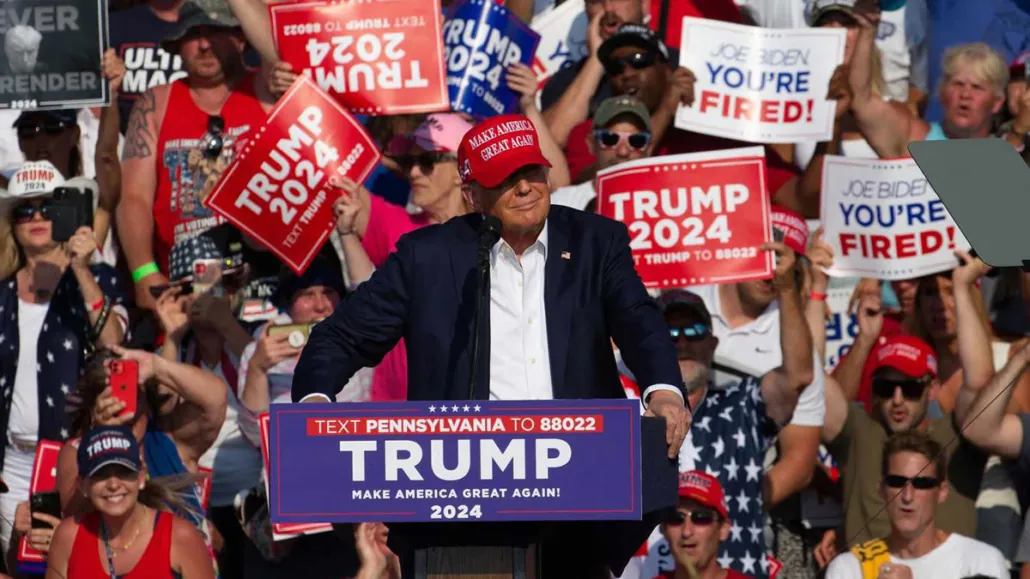
Addressing the E-cigarette Crisis
Initially, Trump did not pay much attention to the e-cigarette issue. However, by 2018, brands like JUUL rapidly gained market share, with flavored products and aggressive marketing strategies leading to a significant increase in teenage e-cigarette use. The CDC reported that by 2019, over a quarter of high school students used e-cigarettes, linking the surge to the appeal of flavors like fruit, mint, and menthol.
In mid-2019, the CDC began investigating an outbreak of lung injuries associated with e-cigarette use, known as EVALI (E-cigarette or Vaping Product Use-Associated Lung Injury). The investigation found many cases linked to THC-containing vaping products, particularly those obtained from informal sources. Vitamin E acetate, a thickening agent added to some THC products, was identified as a primary cause of lung injuries.
The CDC, in collaboration with the FDA and state health agencies, issued warnings against using illegal vape products and certain ingredients.
While most cases were linked to illicit THC e-cigarettes with vitamin E acetate, the issue of youth addiction to e-cigarettes became a public health concern for the Trump administration. Curbing the widespread use of e-cigarettes among teenagers became urgent.
On September 9, 2019, the FDA issued a warning letter to JUUL, accusing the company of marketing unauthorized modified risk tobacco products through labeling, advertising, and activities targeting youth, including school presentations.
Trump’s Response and Regulatory Measures
Acting FDA Commissioner Ned Sharpless warned the industry:
“If the disturbing rise in youth e-cigarette use continues, especially through the use of flavors that appeal to kids, we’ll take even more aggressive action.” – /source

On September 11, 2019, Trump announced a comprehensive plan to ban flavored vapes, citing the widespread use among youth and the ongoing lung disease outbreaks linked to e-cigarettes. The New York Times reported over 50 deaths and 2,500 illnesses due to e-cigarette use.
Trump stated, “We are going to have some very strong rules and regulations.” –source Health Secretary Alex Azar supported banning flavored vapes to curb their use among teenagers.
On December 20, 2019, Trump signed a bill amending the Federal Food, Drug, and Cosmetic Act, raising the federal minimum age for tobacco sales from 18 to 21. This Tobacco 21 law applied immediately, making it illegal for retailers to sell any tobacco products, including e-cigarettes, to anyone under 21.
However, Trump did not aim to destroy the entire industry with a comprehensive flavored vape ban. His campaign manager Brad Parscale expressed concerns that a total ban could harm his voter base, causing Trump to hesitate in formally implementing the ban.
The New York Times reported that a coalition representing thousands of vape shops quickly mobilized, launching a “We Vape, We Vote” campaign on social media and even airing a TV ad in Palm Beach, Florida.
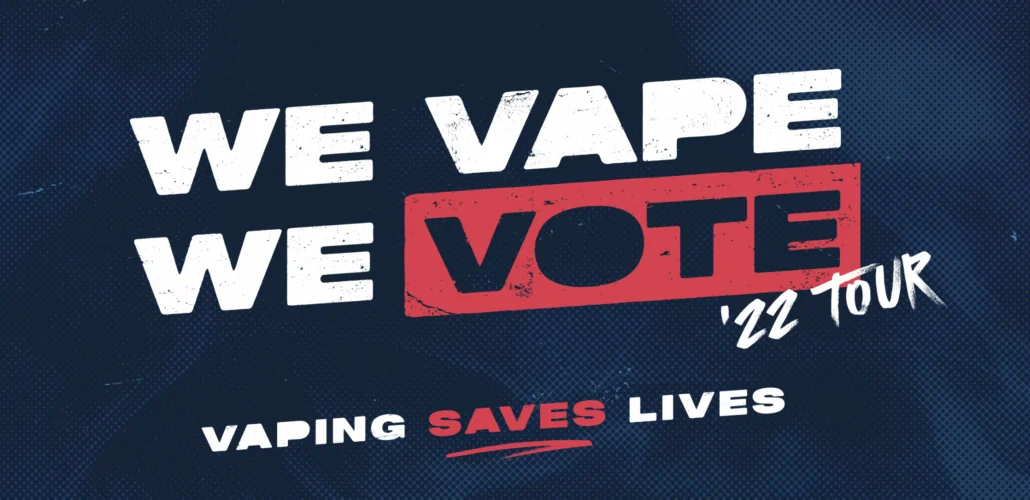
Under pressure from industry stakeholders, small business owners, and adult e-cigarette users who use them as smoking cessation tools, the Trump administration scaled back the proposed ban.
In January 2020, the FDA’s final guidance on enforcement policy on unauthorized flavored cartridge-based e-cigarettes that appeal to children, including fruit and mint. The policy also did not apply to flavored nicotine sold in vape shops using open-tank systems, as research indicated menthol’s popularity among youth was much lower than other flavors.
This set the basic policy for flavored vape products in the U.S. from 2020 to the present.
Trump’s Stance on E-cigarettes: “I Should Absolutely Not Vape”
While liberal media outlets like The New York Times often criticize Trump, focusing on his controversial political tactics, legal issues, and personal behavior, objectively, Trump neither drinks nor smokes. According to NBC, Trump declared himself a teetotaler before the 2016 election, stating he has never consumed alcohol, smoked, or used drugs.
During the formalization of vape policies, Trump held meetings with various stakeholders, including medical experts, industry representatives, policymakers, and legislators.
In November 2019, before issuing the vape policy, Trump demonstrated his understanding of the issue’s complexity, expressing a willingness to develop policies based on comprehensive discussions and evidence. He emphasized the importance of protecting youth during these discussions.
“While e-cigarettes may serve as an alternative for adult smokers, we cannot let them become a starting point for youth nicotine addiction and traditional tobacco use… We must take care of our kids.”
He also acknowledged the potential of vapes as a smoking cessation tool for adults, “You know, vaping can stop smoking (cigarettes), which is better.”
Trump expressed concerns about the regulatory aspects of the vape industry, including product standards and safety, and the potential emergence of an illegal market following a flavor ban:
“But if it’s not being made by Reynolds or JUUL or a legal company, a good company, they’re going to be selling stuff on a street corner that could be horrible.”
Despite discussing various viewpoints and potential solutions, Trump did not commit to a definitive stance at the end of the meeting, only stating that a decision would be announced soon.
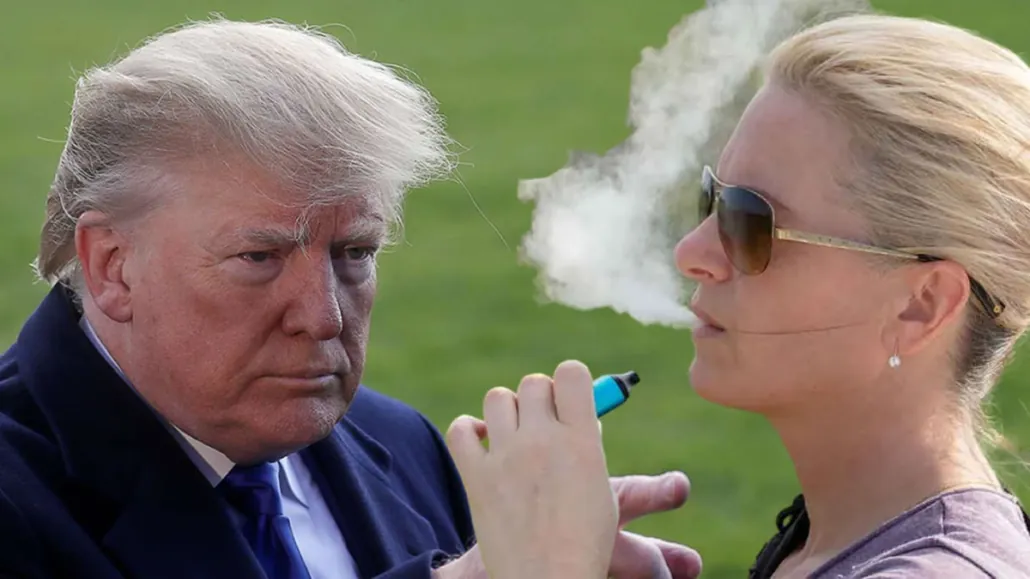
On January 17, 2020, following the announcement of the e-cigarette enforcement policy, The New York Times reported that Trump harshly criticized Azar, exclaiming, “I should absolutely not vape,” adding an expletive.
Some media, like The New York Times commentators, believed Trump’s shift reflected his broader economic priorities, emphasizing the need to protect small businesses and jobs in the vape industry. He advocated a balanced approach that considered both public health and economic impact.
Regarding this matter, White House spokesperson Judd Deere stated:
“We are committed to implementing the President’s policies to improve America’s healthcare system, benefiting everyone, not just individuals.”
Trump himself stated:
“We will protect our families, we will protect our children, we will protect this industry,” noting that some products might “quickly” return to the market.
Despite the issuance of the enforcement policy, associations and organizations following this issue continued to believe the policy was “reserved.” For instance, the American Medical Association (AMA) called for stricter regulations, including a complete ban on using flavored vapes as smoking cessation tools unless approved by the FDA.
Potential Increased Enforcement
If Trump wins the election this year and returns to the White House next year, his influence on the U.S. vape industry is likely to continue balancing public health concerns and economic interests.
We discussed this issue with SKY, an observer of the U.S. vape market. SKY believes that future vape regulation’s core conflict is no longer the FDA’s stance on flavors but the enforcement by the Department of Justice (DOJ), the FDA, and the U.S. Customs and Border Protection (CBP).
“If Trump returns, enforcement by the DOJ and Customs will intensify, so increasing enforcement is certain.”
SKY noted that during Trump’s previous term, he focused on trade circulation and anti-smuggling efforts. As a leader keen on “withdrawing” from agreements, this could lead to a more closed U.S. market. He emphasized that brands and OEM factories are adjustable variables, but the demand for e-cigarettes will not disappear, making the distributor channel increasingly important.
“Whoever controls the channels wins the game.”
Trump may also leverage tariff issues, similar to the trade disputes initiated during his previous term.
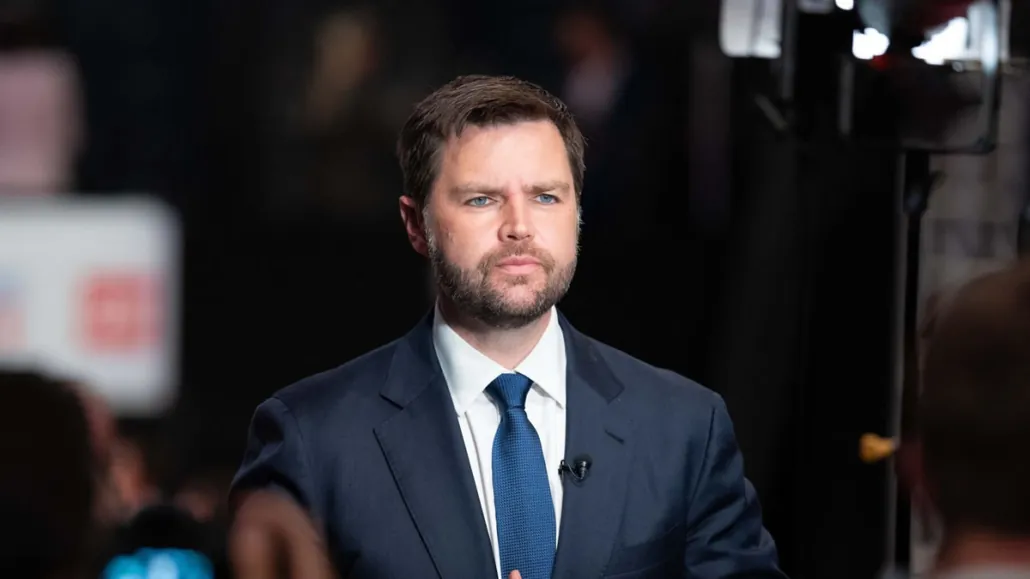
Another variable is his new running mate, JD Vance. Although Vance, a senator since 2022, has not publicly discussed e-cigarettes in detail, his stance on other public health and policy issues suggests his attitude towards e-cigarettes.
According to Politico, Vance has consistently emphasized the importance of public health, criticizing the Biden administration’s weakness on drug issues, particularly the fentanyl crisis affecting communities, which is a significant international cooperation issue.
In a podcast, Vance stated:
“I don’t really care what happens in Ukraine. What I care about is the leading cause of death for people aged 18-45 in my community is fentanyl flowing in from the southern border.”
Thus, Vance supports stringent enforcement to address social issues, including illegal drugs and smuggling. He advocates building the border wall as a key measure to stop these substances’ flow, proposing $3 billion to complete Trump’s wall.
Given his overall policy views, SKY believes Vance might support strict regulation and enforcement as he is a “highly conservative politician on issues like drugs and marijuana.” When e-cigarettes become a focus, Vance might propose similar solutions.
Even if Trump returns to office, vape regulation has evolved since his initial term in 2017. The market, regulations, and product types have changed, with disposable products now dominating over JUUL’s cartridge-based products.
During Biden’s term, the FDA’s vape regulation faced criticism, prompting the FDA’s Tobacco Center to implement reform plans while dealing with slow PMTA review processes.
Notably, this year, menthol-flavored vapes, repeatedly rejected in the past, received FDA approval for the first time. The vape industry sees this as a positive signal: official recognition of menthol flavor opens growth opportunities for compliant companies.
Thus, this election is not only a choice between two candidates but a significant decision on future policy directions. The Trump-Vance ticket promises tough enforcement and economic protection, particularly on drug and e-cigarette issues. Facing the fentanyl crisis, youth addiction problems, and the complex regulatory environment of the vape market,
Regardless of the outcome, the U.S. vape market will undoubtedly experience more changes and challenges in the coming years. Trump’s potential return to the White House makes this election particularly noteworthy, possibly witnessing a former president’s comeback. The butterfly effect of this could trigger significant impacts across the globe, including China, profoundly influencing the industry’s future trajectory.
Refrences:
- Trump Administration Combating Epidemic of Youth E-Cigarette Use with Plan to Clear Market of Unauthorized, Non-Tobacco-Flavored E-Cigarette Products
- Trump 101: He Is Definitely Not a Health Nut
- Trump abandons sweeping vape ban with new slimmed-down rules
- Behind the explosive growth of JUUL
- Vaping Illness Tracker: 2,602 Cases and 59 Deaths
- With Partial Flavor Ban, Trump Splits the Difference on Vaping
- 55 Things to Know About J.D. Vance, Trump’s VP Pick
- A Non-Exhaustive List of J.D. Vance’s Craziest Statements
- Russia’s Vape Market: Inside the Battle for Control - August 8, 2025
- Brazil: Paraná Bill to Add Vaping to “No Smoking” Signs - August 8, 2025
- Celebrate with EightVape: 10 Lucky Winners Get Free Orders or $100 Gift Cards - August 8, 2025

